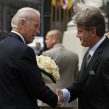
Ukraine-U.S. Relations: New Prospects in the Wake of Biden’s Visit
Publication: Eurasia Daily Monitor Volume: 6 Issue: 144
By:

U.S. Vice-President Joe Biden held out prospects for a revitalized and expanded relationship with Ukraine during his July 20-22 visit to Kyiv (and Georgia on the next leg). A prompt follow-up to President Barack Obama’s July 6-7 Moscow visit, the vice-president’s trip was designed to demonstrate U.S. intentions to revert to strategic engagement in Europe’s East.
Biden’s two public speeches in Ukraine offered strong reassurances that Washington would not sacrifice Ukraine’s (or any other countries’) interests while seeking Moscow’s support for U.S. interests in other theaters. Biden ruled out such "trade-offs." The United States shall not "recognize" any spheres of influence; its "resetting" of relations with Russia will not involve concessions at the expense of Ukraine – or of U.S. relations with Ukraine and other countries neighboring Russia; no country [i.e., Russia] is entitled to interfering with other countries’ policies, relationships, and choice of alliances; the United States is committed to supporting an independent and democratic Ukraine as an "integral part of Europe" as well as Ukraine’s Euro-Atlantic integration "if you choose that" (Joe Biden speech at Ukraine House and news conference in Kyiv, White House press releases, July 21, 22).
The practical value of such reassurances will partly depend on developing an active U.S. policy toward Ukraine and its European orientation and, on the other hand, developing Ukraine’s institutional capacity to partner with the United States strategically for such a policy. On the American side, Biden’s message conveyed a willingness to overcome the "Ukraine-fatigue" that had afflicted U.S. and (even more so) European policies toward a dysfunctional post-Orange Ukraine. The U.S. vice-president visited a country that does not have ministers of foreign affairs, defense, finance, and transport -and since 2005 it has experienced a crisis in its political and legal institutions.
With Ukraine scheduled to hold a presidential election in January 2010, Biden’s Kyiv agenda included talks in Kyiv with presidential hopefuls Viktor Yanukovych and Arseniy Yatseniuk (leaders of the Party of Regions and Front for Change, respectively) in addition to his meetings with the weakened President Viktor Yushchenko, Prime Minister and presidential hopeful Yulia Tymoshenko, and Parliamentary Chairman Volodymyr Lytvyn (potential compromise figure) (Interfax-Ukraine, UNIAN, July 21 – 23).
Biden’s visit laid some of the groundwork for re-launching U.S.-Ukrainian strategic partnership relations under the Obama administration and pending Ukraine’s presidential election. The agenda’s salient issues will include activating the U.S.-Ukraine Strategic Partnership Commission. Biden and Yushchenko agreed that the commission will hold its inaugural meeting in the fall in Washington. The commission is meant to operationalize the U.S.-Ukraine Charter of Strategic Partnership, signed by the outgoing Bush administration in December 2008. The commission’s inaugural meeting will probably be largely symbolic. Due to elections and transitions in both countries one after the other, the charter’s activation will probably be delayed into mid-2010 (assuming a willing Ukrainian president and government after the January 2010 elections there). Meanwhile, the inaugural meeting’s agenda in the fall will include the issues of Ukraine’s security in the region, energy policy, and the rule of law in the country.
Re-launched partnership with Ukraine will also aim at improving Ukraine’s energy security. Biden discussed with Tymoshenko and Yushchenko the implementation of recently signed agreements on nuclear energy with the Westinghouse and Holtec companies. The agreements aim to provide nuclear fuel for Ukrainian nuclear power plants and launch nuclear fuel production in Ukraine, so as to reduce the country’s now-total dependence on Russian nuclear fuel. Regarding natural gas transit, the United States does not plan to participate in financing the upgrade of Ukraine’s pipeline system. Washington expects the European Union and international lending institutions to address this task, in conjunction with Ukrainian actions to introduce transparency, efficiency, and realistic internal prices in the energy sector. In his public speeches in Kyiv, Biden urged such actions in outspoken terms, also linking the issue of energy security with that of national security for Ukraine. This coming fall will see the first fully-fledged meeting of the U.S.-Ukraine working group on energy security.
Finally, there must be adequate financing for anti-crisis programs. The International Monetary Fund (IMF) has disbursed the first two tranches of a $16.4 billion anti-crisis package that the United States supported. Disbursement of the remainder, however, is conditional on a decision by the Ukrainian government to raise internal prices for natural gas prices for domestic consumers through at least partial elimination of state subsidies. More realistic prices could also save Naftohaz Ukrainy from the constant threat of bankruptcy and possible takeover of its pipelines by Gazprom. A price hike by Yulia Tymoshenko’s government ahead of the January 2010 presidential election could, however, predetermine Tymoshenko’s defeat and the victory of her rival Viktor Yanukovych. Meanwhile, the Tymoshenko government agreed during Biden’s visit to settle the claims of the U.S. Overseas Private Investment Corporation (OPIC) in the country. This move will enable OPIC to resume its activities in providing risk-protection for U.S. small and medium-sized entrepreneurs investing in Ukraine (Interfax-Ukraine, UNIAN, July 21 – 23).




